Lemurs For Sale


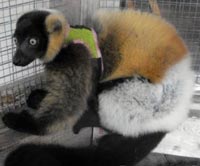
Lemur Overview
Lemurs are strepsirrhine Primates, identified by their soggy nose or rhinarium. They likewise have a more diminutive cerebrum than equivalently measured simians, huge olfactory projections for scent, a vomeronasal organ to discover pheromones, and a bicornuate uterus with an epitheliochorial placenta. Their eyes hold a reflective layer to enhance their night vision, and their eye attachments incorporate a ring of bone around the eye, however they fail to offer a divider of slender bone behind it. Strepsirrhine primates process their own distinctive vitamin C, thus don't need to get it from their eating regimens.
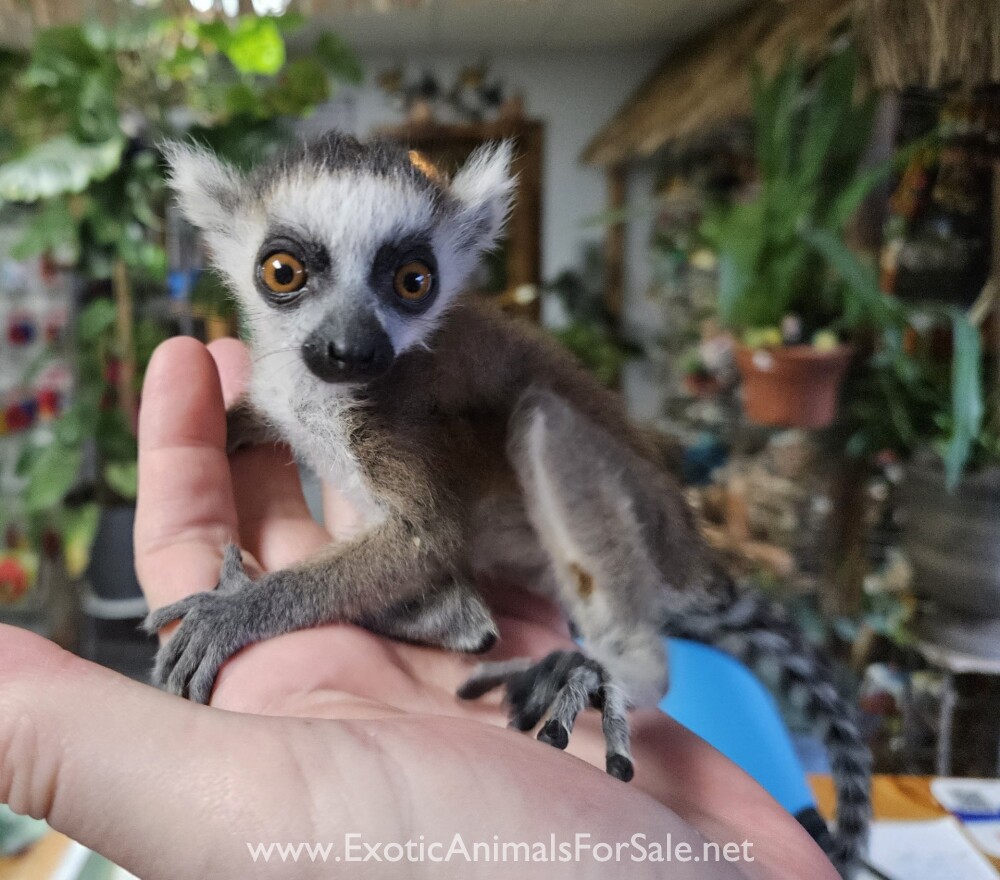
Ringtail Lemurs! Reserve yours now!
- Name: Panhandle Exotics
- Posted: 01/05/2026
- Phone: 8505424410
- Location: Florida
- Website: www.PanhandleExotics.com
- Trusted Seller
If you're wanting a Ringtail Lemur this season, get on the list ASAP! FLORIDA RESIDENTS ONLY!!! These guys are only available in the spring & summer and we go in order of reservations. Reserve yours now for just half down! This guarantees y...
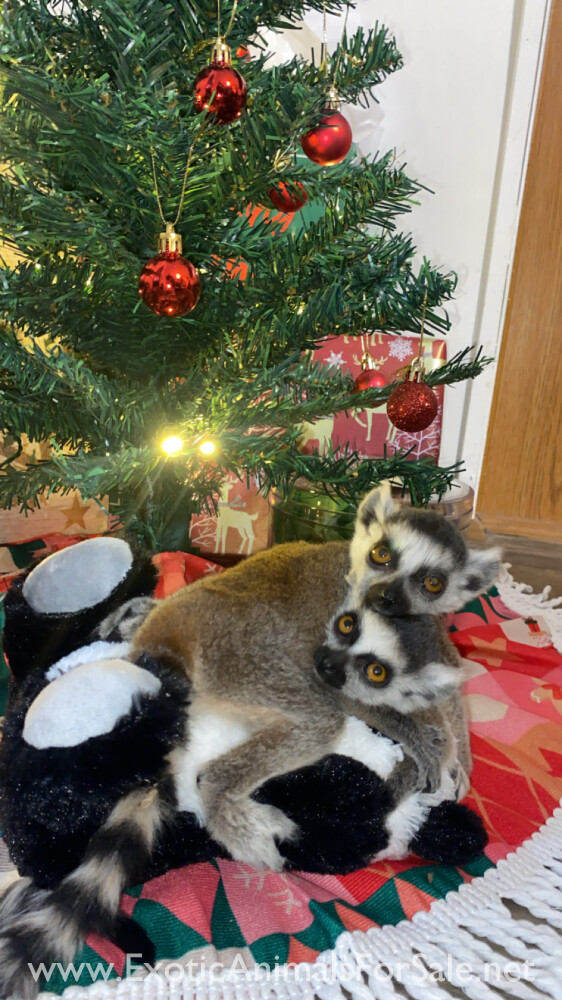
Ring tail lemur
- Price: $2,500.00
- Name: Hailey Hough
- Posted: 12/27/2025
- Phone: 4173091184
- Email: Email Seller
- Location: Missouri
Female ring tailed lemurs. Eating solids and ready to go. USDA licensed facility. Must stay in the state of Missouri.
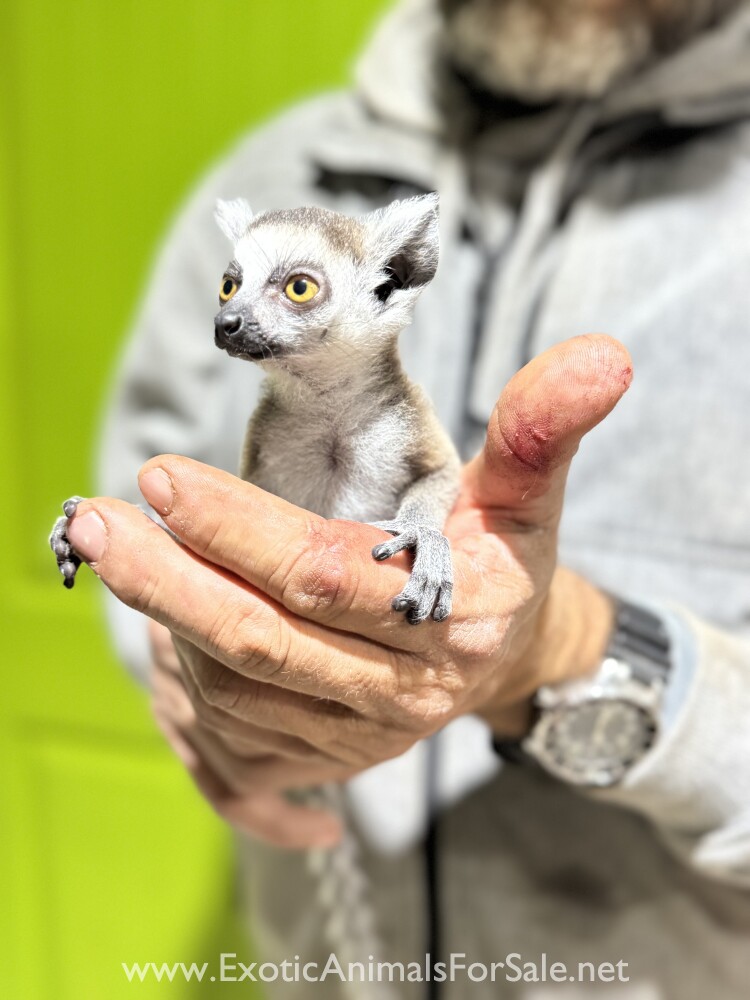
Ringtail Lemur male Baby
- Price: $1,700.00
- Name: Nikki
- Posted: 12/23/2025
- Phone: 5804656363
- Email: Email Seller
- Location: Oklahoma
Male ringtail lemur male baby 6 weeks old.
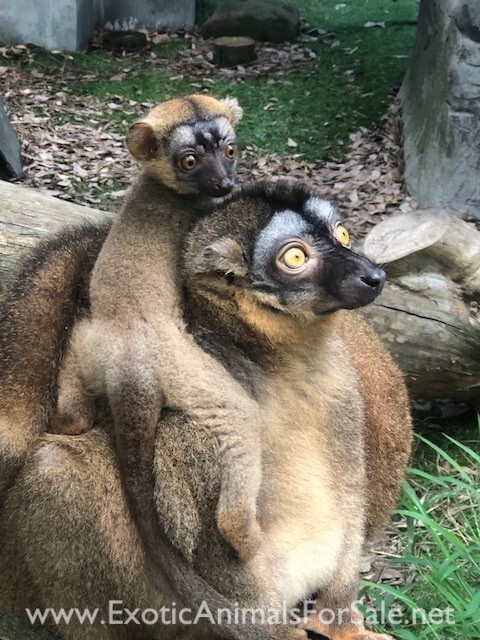
Brown Lemur Male
- Name: Pam Sweeney
- Posted: 12/18/2025
- Phone: 7135696745
- Email: Email Seller
- Location: Texas
Truman was born here (May 2025), mother raised, doesn't like to be handled but sweet. We are USDA and prefer he go to USDA facility. Will not go to a broker. Texas only. Plz text or call for more info: 713.569.6745. $3500
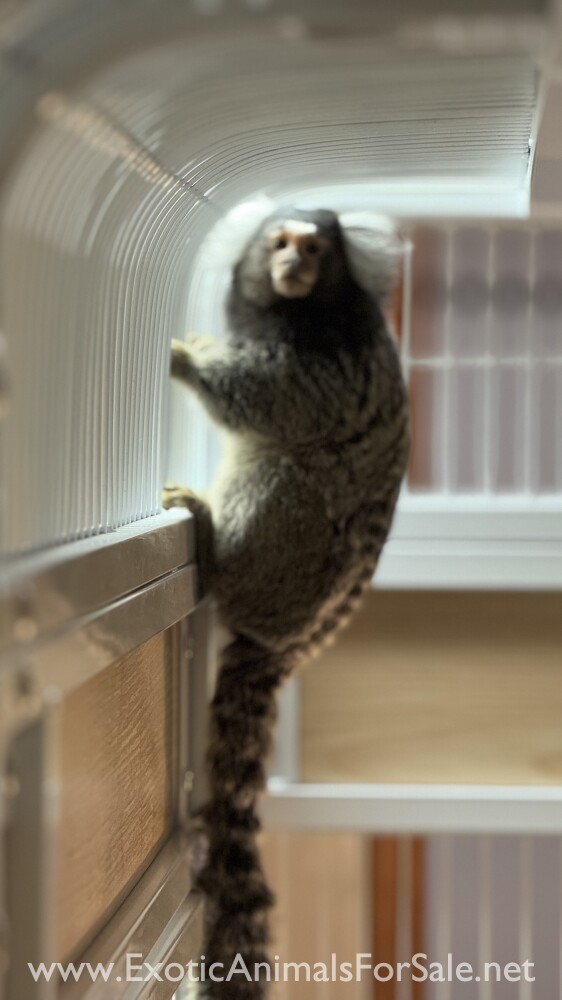
Male Marmoset
- Price: 2000 or trade
- Name: Charlie
- Posted: 12/09/2025
- Email: Email Seller
- Location: Ohio
Eight year old white-tufted marmoset. Recently lost his mate. Would like him placed with another female or a least where he can see or communicate with other marmosets. Not a pet, but not mean. I enter the enclosure to feed and clean with no issues a...
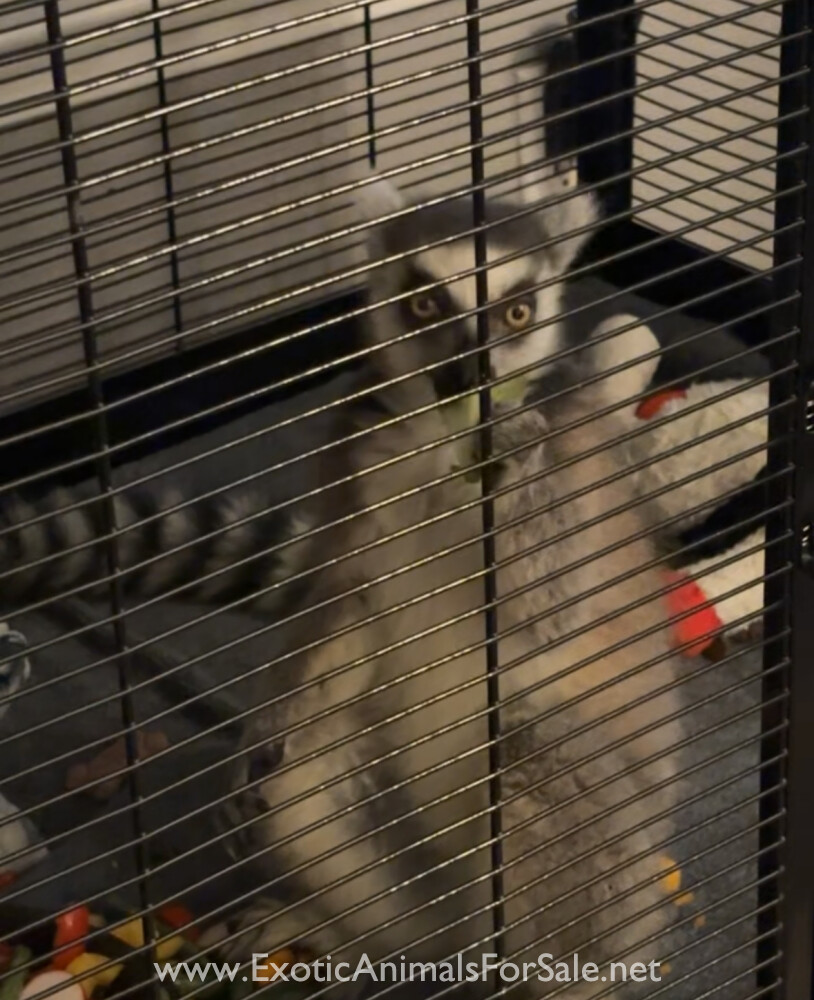
Female Ringtail Lemur
- Price: $3,000.00
- Name: Josh
- Posted: 10/26/2025
- Phone: 9803293499
- Email: Email Seller
- Location: Florida
1 yr old Female Ringtail Lemur Bottle Raised Friendly Please contact for more details.
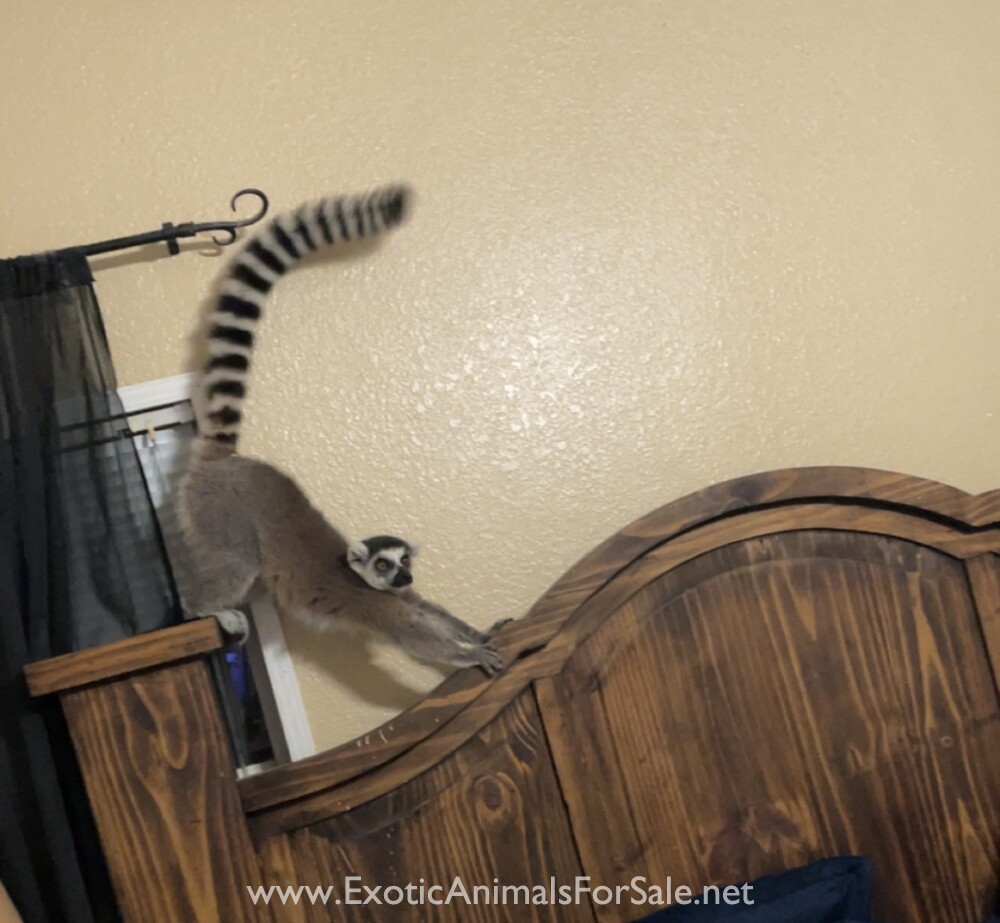
5 year old female ringtail lemur
- Price: $2,000.00
- Name: Brandi
- Posted: 09/17/2025
- Phone: 6619658124
- Email: Email Seller
- Location: Texas
Friendly and easy to handle female, I wouldn’t consider her a cuddly pet but will go in to her travel crate willingly and has never shown aggression, will come and get food out of your hand and hangout with you in her enclosure. Must stay in Texas.
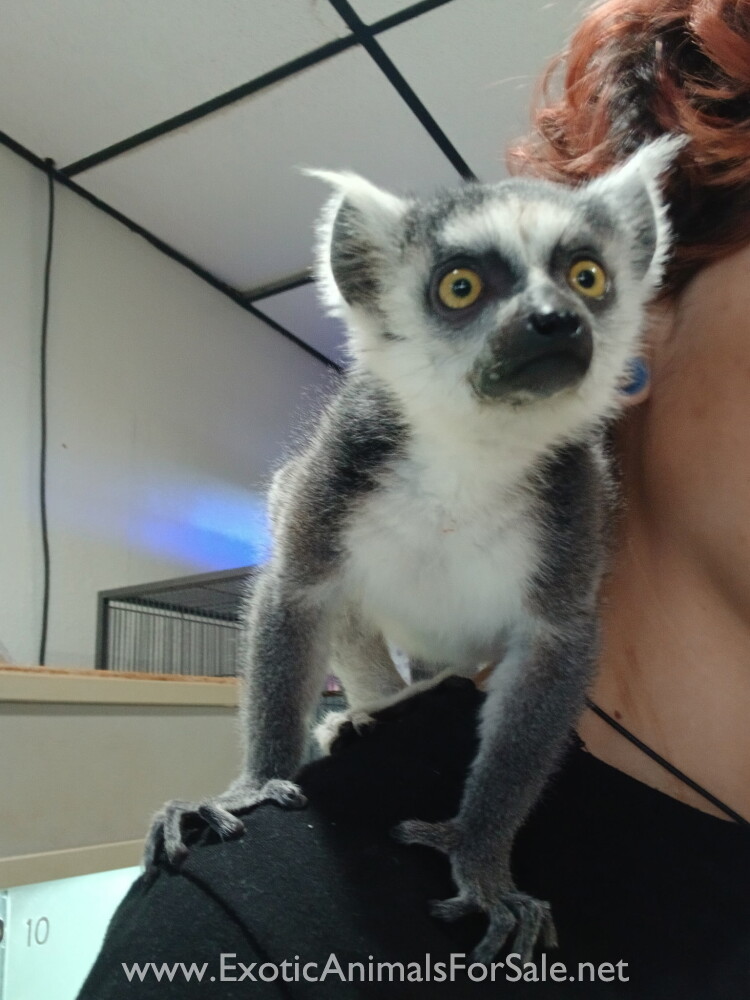
Baby Girl Lemur
- Price: $3,500.00
- Name: Andrews Animal House
- Posted: 09/10/2025
- Phone: 9155022342
- Email: Email Seller
- Location: Texas
This Lil girl is looking for new branches to jump on! She's 4 months old, socialized, doesn't like a diaper but will wear one and super lovie dovie.

Ringtail Lemur baby
- Name: Ginger Satterfield
- Posted: 08/24/2025
- Phone: 8653212432
- Email: Email Seller
- Location: Tennessee
Ringtail lemur baby male 5 weeks old Knoxville / Del Rio Tn 865-321-2432

Ruffed 14 week old female lemur
- Price: $7,000.00
- Name: Brianna Holzerland
- Posted: 08/12/2025
- Phone: 7273009822
- Email: Email Seller
- Location: Florida
We have a red ruffed lemur that’s available. She has lived in the house and has been heavily socialized. She’s worked during interactions in yachts in key west and duval street. She’s been living with capybaras and dogs as well. We are ONLY selling h...
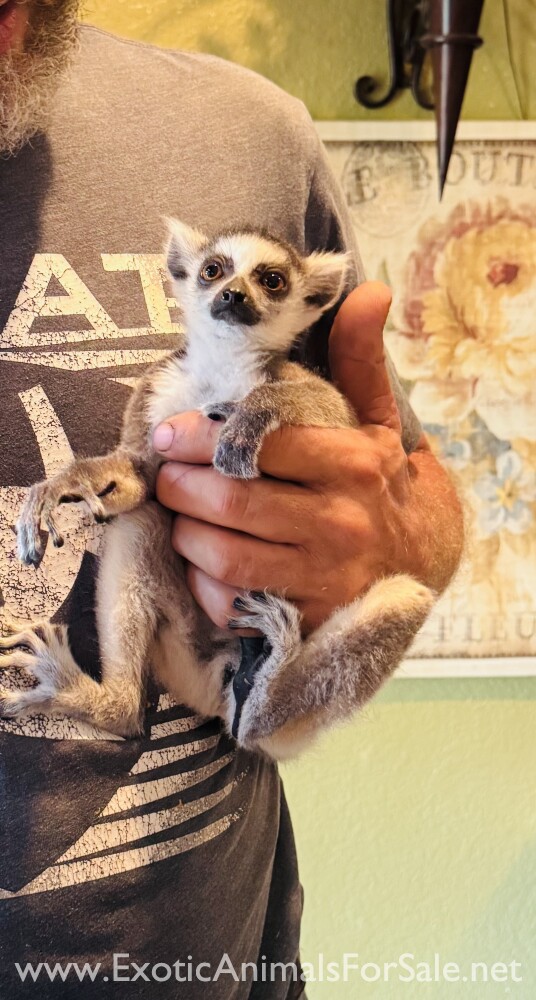
Ringtail Lemur
- Price: $1,700.00
- Name: Stafanie
- Posted: 08/07/2025
- Phone: 5804656363
- Email: Email Seller
- Location: Oklahoma
Ringtail lemur male for sale mother raised for 10 weeks. Now being socialized and working on harness training. $1700 Oklahoma resident only
ring tail Lemurs
- Price: 6,000
- Name: john c messmer
- Posted: 08/01/2025
- Phone: 7068330801
- Email: Email Seller
- Location: North Carolina
Group of 9 Adult Ringtail Lemurs 6F and 3 males only selling as a group Right now MUST be a NC resident. please call or Text rarely check emails
Ringtail Lemur babies
- Price: 1250.00 each
- Name: Scott
- Posted: 06/26/2025
- Phone: 254-977-4962
- Email: Email Seller
- Location: Texas
2 baby ring tail lemurs. Mother raised. call scott 254-977-4962 Texas residents only.

Trio of Ring Tailed Lemurs
- Name: Corey
- Posted: 06/21/2025
- Phone: 7655921912
- Email: Email Seller
- Location: Indiana
Mom, dad and daughter selling together. Mom and dad are in teens. Daughter is 3. Daughter has never had baby. Dad has injured tail that has healed and doesn’t bother him. Motivated to sale! Indiana only. USDA facility. Feel free to text me at 765-592...

Ringtail lemurs
- Name: Seth
- Posted: 06/13/2025
- Phone: 8134155115
- Email: Email Seller
- Location: Florida
- Website: Kizerexotics.com
Male and two female bonded troop goes as a group not breaking them up txt or call for serious inquiries Florida only.
They are medium-sized growing to about 70 cm tall at adulthood, with tails almost equal in length with the body. Lemurs have sharp-clawed prehensile feet, which they use to hold on to tree branches. They include the minutest world's primate, the Madame Berthe's mouse lemur, which is the size of the Indri and weighs about 30 grams.
Lemurs, well known for their large, ball-like reflective eyes and wails, have long tails and pointed furry ears. They somehow resemble squirrels and monkeys. They are omnivorous in nature, extracting their food from surrounding trees, but occasionally foraging forest floor for grub. The most common species on the island of Madagascar are; the woolly lemur, ring-tail lemur, russet mouse lemur, white ruffed lemur and the Aye Aye lemur.
Well known Species and subspecies of Lemurs include:
Gray Mouse Lemur
The gray house Lemur resembles a rodent in appearance and also name but is very much a primate.
Black Lemur
The Black lemur has two sub-species, the E. Macaco Lemur and Slader Lemur. They have overlapped and interbred in many locations
Red Ruffed Lemur
This is a medium-sized lemur that is very different socially and prefers isolation. They do not even share feeding zones with the other species.
Coquerel's Sifaka
This species is medium sized and belongs to the primate family. It features a very different physical appearance and behaviour from other lemurs.
Verreaux's Sifaka
Verreaux's Sifaka Lemur is relatively smaller than other species. It resembles numerous small species of monkeys. Consequently, many classify it as a primate.
Golden-Crowned Sifaka
This species is very limited in location and number. Not much information is known about this species
Collared Brown Lemur
this is medium in size lemur that is brown in color and consists of 12 species worldwide. The Collared Brown Lemur is the best known of the species.
Indri Lemur
this is also known as the Babakoto in many places. Indri Lemur is one of the biggest Lemurs in the world. These lemurs seem to ape many humanistic behaviors and have very distinctive characters.
Ring-Tailed Lemur
This is the best-known and most popular Lemur species from Madagascar. It has a distinctively ringed tail and a body that is uniquely different from the others. It is also one of the most intelligent of all lemur species. The ring-tailed lemur is the most commonly known and studied species. This lemur's tail has distinctive black and white ring marks, but with a gray body fur and ears with white tufts.
Aye-Aye
Aye-Ayes are the largest primate in the world and are nocturnal. Due to its distinct long middle fingers, the Aya Aye lemur appears to be different from the others.
Housing Lemurs In captivity
Lemurs can be reared in caged captivity or indoors provided optimal survival temperatures meet. Ideally, these temperatures should be between 65° F - 85° F (18 and 29° C).
Keeping lemurs in captivity may involve restricting them behind cage enclosures, open enclosures and Island enclosures. The ring-tailed lemur for example, requires a cage enclosure of 2.5mm wire diameter and 25mm*25mm maximum dimension of the mesh. Island enclosures on the other hand have a 3.0 m moat width as a minimum, with 0.5 m as the minimal height of the perimeter moat wall. The perimeter moat wall's water should have a minimum depth of 0.9 meters. The moat should have an upward slope facing the land.
When kept indoors as pets, good ventilation should be provided for to allow sufficient airflow. It is advisable that keepers have a good knowledge of handling and husbandry techniques of the species. A second appointed competent handler should be available just in case of owner absenteeism or incapacitation.
Breeding Lemurs
Breeding lemurs in captivity is a difficult task due to targeted aggression, which necessitates the forehand removal of males in the mating group. Breeding pairs should also be kept in isolation for guaranteed offspring paternity.
What do lemurs eat?
Lemurs in any form of captivity should be fed with starchy vegetables, fruits, leafy vegetables and greens. Fruits should include bananas, apples, oranges and grapes that are relatively available all year round. Seasonal fruits should also be provided. Vegetables should include cucumbers, green beans, broccoli and celery. Feed Lemurs in captivity once or two times daily. It is important to practice diet rotation to provide variety.
Fresh water availability is necessary. Chopping food into equal portions enables each group member to access preferred food that can comfortably fit into their small mouths. Keepers are supposed to give several times throughout the day and in different tree levels and locations. This effectively restricts aggression and crowding around feeding zones. Diet selectivity and obesity may result from chronic overfeeding. Thus, feeding is planned such that left over or uneaten food should not exceed 15% of the diet.
Lemur Veterinary Care
Lemurs in captivity are sensitive and need optimal veterinary care to survive. Those owning a lemur as a pet or keeping it in captivity, regardless of which type, need to administer annual frequent veterinary health checks to these animals and make any necessary treatments. These checks include;
- Regular fecal check-ups for worm egg floats and frequent de-worming treatment for various worm infestations
- Annual tests for Tuberculosis infection
- Tests for blood sugar levels to check for obesity due to weight gain, and iron levels to test for haematochromatosis
- Frequent checks for microchips and whether they are still in the location of administration
- Sanitize and clean the enclosures frequently. Check for and remove snails or slugs as they present the risk of Rat lungworm infection.
Other potential health issues for lemurs in captivity include Toxoplasmosis infection transmitted from cat feces. It is advisable to keep cats away from lemurs to avoid possible contamination. Dermatophytosis and Herpes Virus infection/cold sores from human subjects should also be kept in check.







Comments